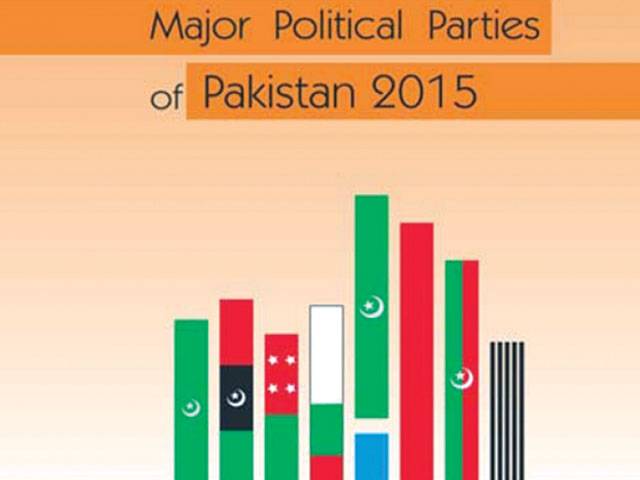ISLAMABAD - Major political parties in Pakistan lack internal democracy besides having credibility problems when it comes to their annual financial statements mandatory under the constitution, said a survey launched yesterday.
The PILDAT Report on ‘internal democracy of major political parties of Pakistan 2015’ concludes that the selected eight political parties received an overall score of 40 out of 100, which indicates a drop from the overall score of 43 in 2014.
“This shows that the state of internal democracy of political parties in Pakistan – although was not in a good shape the previous year – further deteriorated in 2015,” the survey said in its annual report.
The findings have noted an almost converse relationship between the quality of internal democracy of political parties and their mass popularity. “PML-N, MQM and PPP are popular parties and their weak internal democracy has not come in the way of their mass appeal,” observed PILDAT President, Ahmed Bilal Mehboob.
However, he said religious political party Jamaat-e-Islami (JI) and the nationalist Balochistan-based National Party (NP) on the other hand, are rated the most democratic parties but they seem to have a very weak mass appeal.
In fact the scorecard of PILDAT assessing internal democracy of eight political parties in Pakistan places the Jamaat-e-Islami (JI) with 56 percents core (No. 1), the National Party (NP) with 47 percent score (No. 2), the PTI with 44 percent (No. 3).
The Awami National Party (ANP) has scored 40 percent (No. 4), the Pakistan People’s Party (PPP) with 36 percent (No. 5), the Jamiat Ulema-e-Islam-Fazlur Rehman (JUI-F) and Muttahida Quami Movement (MQM) (both at No. 6) with 33 percent score.
The ruling Pakistan Muslim League Nawaz (PML-N) has scored the lowest (31 percent) thus lagging behind all political parties in terms of internal democracy and other factors.
In order to assess democracy within political parties objectively and scientifically, a framework consisting of 12 indicators was devised by a broad-based Steering Committee constituted by PILDAT.
Credibility of political parties’ annual statements of accounts submitted to the Election Commission of Pakistan and whether their funding base was wide enough, received the lowest score of 26 percent.
PILDAT’s 2014 report had shown somewhat similar results that the two weakest indicators were change in top party leadership, lack of credible funding base and audited statement of accounts.
Eight major political parties were selected for the assessment. Five of these parties (PML-N, PPP, PTI, JUI-F and MQM) hold the largest number of seats in the current National Assembly (2013-2018).
Three other parties were chosen to either represent Balochistan (NP) and Khyber Pakhtunkhwa (ANP) or to capture a peculiar brand of internal democracy in the form of the Jamaat-e-Islami (JI).
A party-wise account of each of the 12 indicators was compiled after collecting data from various sources including the political parties. This account became the basis of quantitative assessment (scoring) for the parties.
The survey indicates that the overall quality of political parties’ internal democracy slipped from 43 percent in 2014 to 40 percent in 2015. It said most of the parties mere lengthened shadow of their leaders.
It says that intra-party elections were mere formality in most cases while the parties’ funding shrouded in vagueness as ECP lacked capacity to check compliance with the relevant law governing funding of political parties.
The annual survey said that parties’ decision-making bodies generally were weak and ineffective.
However, it said that the next PTI intra-party election will be a defining event for internal democracy of political parties.
It said that PTI’s 2012-13 party elections were among the most popularly contested and were elaborate party elections in the country’s history, but these turned out to be deeply flawed by the party’s own admission.
“Its next intra party elections scheduled for 2016 will decide not only the party’s own democratic credentials, but the success or failure of this experiment may also decide future trends in the internal party elections of political parties in Pakistan,” said Mr Mehbood noted.
As debate on the state of internal democracy in political parties were debated on social media, PTI’s senior leader Ishaque Khakwani said intra party elections in PTI must follow its Constitution and that this has been his stance ever since the exercise started.
Regular elections, regular change in leadership through election, and discouragement of dynastic leadership within the party, have apparently favoured the JI rated as the most democratic political party.
Similarly, the NP led by Senator Hasil Bizinjo has been rated as second for having internal democracy and regular change of party heads since its inception in 2003.
Friday, November 22, 2024
Ruling PML-N ‘least’ democratic party
| Pildat report says JI, NP most democratic parties but lack public appeal

1:09 PM | November 09, 2024
10:25 AM | November 09, 2024
Mohsin Naqvi, UK’s Falconer discuss strengthening Pakistan-UK ties
November 22, 2024
UAE deputy PM arrives in Pakistan on private visit
November 22, 2024
Court initiates process to declare Gandapur as absconder
November 22, 2024
Imran’s statement from jail reflects growing frustration: Tarar
November 22, 2024
Russia hits Ukraine with new mid-range ballistic missile, says Putin
November 22, 2024
-
Hunger crisis to increase in South Sudan, warns UN
-
Hunger crisis to increase in South Sudan, warns UN
-
Pakistan’s judiciary champions climate justice at COP29 in Baku
-
Punjab struggles with persistent smog as Met Office forecast rainfall
-
Punjab residents face escalating smog crisis as pollution levels soar across country
-
Qatar says Hamas 'no longer welcome' in Gulf state
Land of Vigilantes
November 21, 2024
United in Genocide
November 21, 2024
Finally Fighting Back
November 21, 2024
Digital Stagnation
November 20, 2024
Xi’s Red Lines
November 20, 2024
Independent Supreme Court
November 21, 2024
Fat Loss Fantasy
November 21, 2024
Tackle Corruption Within School Boards
November 20, 2024
To Be Opportunistic
November 20, 2024
Democratic Backsliding
November 20, 2024
ePaper - Nawaiwaqt
Nawaiwaqt Group | Copyright © 2024





